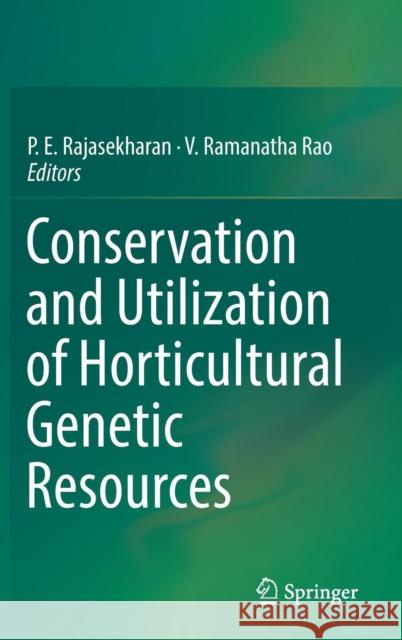Conservation and Utilization of Horticultural Genetic Resources » książka



Conservation and Utilization of Horticultural Genetic Resources
ISBN-13: 9789811336683 / Angielski / Twarda / 2019 / 680 str.
Conservation and Utilization of Horticultural Genetic Resources
ISBN-13: 9789811336683 / Angielski / Twarda / 2019 / 680 str.
(netto: 613,40 VAT: 5%)
Najniższa cena z 30 dni: 616,85
ok. 22 dni roboczych.
Darmowa dostawa!
Ch 1 An overview of horticultural genetic resources diversity, distribution and conservation
Ch 2 Horticultural Genetic resources conservation
Ch 3 Feasibility of Conservation of Horticultural Genetic Resources in In Situ
Ch 4 Genetic Resources of Tropical Fruits
Ch 5 Vegetable Genetic Resources
Ch 6 Biodiversity and Conservation of Ornamental crops
Ch 7 Genetic Resource of Mango
Ch 8 COCONUT GENETIC RESOURCES
Ch 9 Spices Genetic Resources
Ch 10 BANANA GENETIC RESOURCES
Ch 11 Genetic Resource of Guava
Ch 12 Medicinal plant genetic resources
Ch 13 Management and Conservation of Underutilized Fruits
Ch 14 Crop Wild Relatives of Selected Perennial Horticultural Crops in Andaman and Nicobar Islands
Ch 15 Wild Relatives of Horticultural Crops
Ch 16 Geographical Information System and Management
Ch 17 Field Genebank and Clonal Repositories
Ch 18 IN VITRO CONSERVATION AND CRYOPRESERVATION OF CLONALLY PROPAGATED HORTICULTURAL SPECIES
Ch 19 Cryopreservation Techniques for Conservation of Tropical Horticultural Species
Ch 20 Molecular Characterization
Ch 21 Traditional knowledge in Horticulture
Ch 22 Access and Benefit Sharing of Horticultural Genetic ResourcesCh 23 Future needs of horticultural genetic resources conservation and its improved use with that focus on livelihood improvement and income generation in rural India
Dr. P.E.Rajasekharan is a Principal Scientist at the ICAR Indian Institute of Horticultural Research Bangalore. Dr. Rajasekharan completed his PhD in in vitro conservation of threatened medicinal plants at the Department of Botany, Bangalore University and is known for his contributions to the area of Plant Genetic Resources, i.e. in vitro conservation and cryopreservation of horticultural crops. In addition, he has developed globally applicable cryopreservation protocols for the conservation of nuclear genetic diversity (NGD) in pollen of important vegetable, ornamental and endangered medicinal species. He currently teaches courses on Plant Genetic Resources and Intellectual Property Rights in Agriculture. Dr. Rajasekharan has more than 175 articles and two books to his credit. He is an expert reviewer for several international peer-reviewed journals, and sits on the editorial board of several others. He is a Fellow of the Indian Society of Plant Genetic Resources and Indian Association for Angiosperm Taxonomy.
Dr V. Ramanatha Rao holds a PhD in Genetics and Plant Breeding from the Indian Agricultural Research Institute (IARI), New Delhi. Dr Rao has worked on various aspects of plant genetic resource conservation and the utilization of different crop and forestry species, initially at the global level and later more specifically focusing on plant genetic resources in Asia, the Pacific and Oceania. He started his work on genetic resources of groundnut at the International Crops Research Institute for the Semi-Arid Tropics (ICRISAT, 1976-1989) and established the largest groundnut genetic resources collection. He subsequently worked at the International Board for Plant Genetic Resources/International Plant Genetic Resources Institute (IBPGR/IPGRI), presently Bioversity International, Rome (1989-2007). He was an Honorary Research Fellow with Bioversity International from 2008 to 2014. In the course of various programmes and projects, Dr Rao has enriched the global knowledge base on plant genetic diversity; conservation and use methods of tropical fruits, underutilized crops, forest genetic resources; ex situ and in situ (on-farm) conservation; use of plant genetic resources to improve the livelihoods of the rural poor; use of modern technologies for genetic diversity studies; enhancing the utilization of conserved germplasm; and human resource development projects. He has helped in either establishing or improving national plant genetic resources programmes in several countries throughout Asia. In addition to teaching and serving as an editor for a number of international peer-reviewed journals, he has over 300 publications, including several books, to his credit.
The conservation of crop genetic resources is one of the important elements in efforts to sustainably increase agricultural production in low-income countries, and to guarantee long-term food security, especially for the low-income population groups in these countries. Horticultural crops, as high-value crops, have an important role to play in revitalizing rural economies and can add significantly to national economies. Moreover, horticulture provides more than twice the number of jobs compared to traditional cereal crop production, and the shifting of conventional agriculture towards high-value horticulture has increased employment opportunities in developing countries.
To exploit this potential, researchers need a vast array of horticultural genetic resources and information on new traits. Horticultural crops, which are only a part of PGRFA (Plant Genetic Resources for Food and Agriculture), are characterized by a wide and varied range of species. In fact, there are five major horticultural crop groups: fruit and nut crops, vegetables, food legumes, roots and tubers, and lastly the ornamental and medicinal group.In this context, the present book provides a comprehensive overview of the current state of conservation and utilization of horticultural genetic resources, addressing contemporary approaches to conservation in connection with different technologies, including biotechnological approaches as practised in India and in some cases, globally. It includes a brief chapter on the unique nature of horticultural genetic resources, providing a rationale for viewing them as being distinct from field crop genetic resources. Subsequent chapters share insights on protocols for the conservation of selected horticultural crops ex situ, and focus on the increased need to complement these efforts with in situ conservation approaches. Geospatial tools are also briefly described, emphasizing their utility with regard to mapping and managing resources.
The book also explores the wild gene pool in horticulture crops; discusses legal aspects related to horticultural genetic resources and biotechnological aspects; and describes the key aspects of sustainable management and replenishment. Given its scope, the book offers a valuable resource for all horticulturists, graduate students, researchers, policymakers, conservationists, and NGOs engaged in horticulture in particular and biodiversity in general.
1997-2026 DolnySlask.com Agencja Internetowa
KrainaKsiazek.PL - Księgarnia Internetowa









